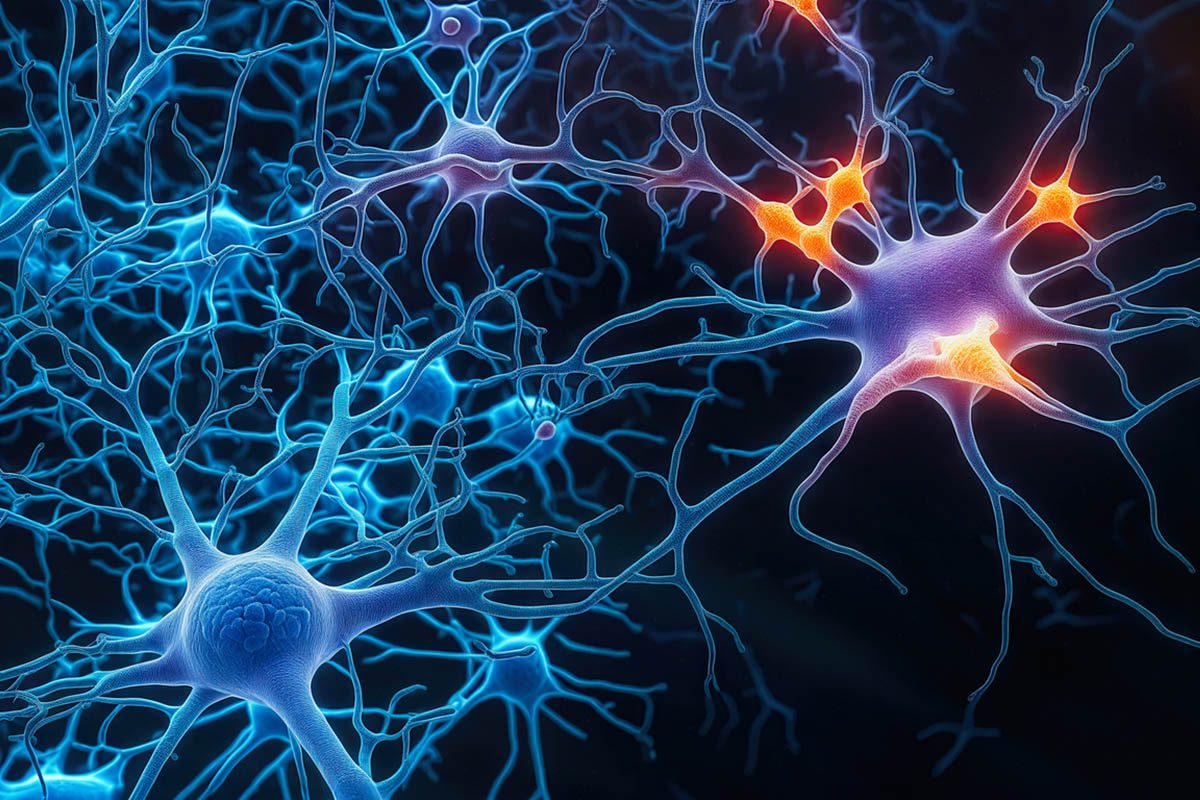Bipolar disorder is a chronic mental illness characterized by alternating episodes of mania, hypomania, and depression. The etiology is multifactorial, involving genetic, neurobiological, and environmental factors.1 There is increasing evidence of a bidirectional relationship between thyroid dysfunction and mood disorders.2,3 Although thyroid dysfunction is commonly associated with affective disorders, the co-occurrence of thyroid malignancy and bipolar disorder is infrequently reported.4 This case highlights the challenges of managing bipolar disorder in the context of an incidental diagnosis of papillary thyroid carcinoma (PTC).
Case Report
A 50-year-old woman presented with a 4-month history of low mood, fatigue, sleep disturbances, and loss of appetite. The symptoms were mild at presentation, as she had been taking olanzapine 5 mg and quetiapine 50 mg for the past 4 months.
Her past psychiatric history revealed that 2 years prior, at the age of 48 years, she developed symptoms of increased talkativeness, heightened energy levels, increased goal-directed activity, over-religiosity, and suspiciousness. Her suspicions were primarily centered around her neighbors, believing they were observing her and planning to kill her. She was diagnosed with bipolar disorder—mania with psychotic features—and was treated for approximately 1½ years. She had no family history of psychiatric illness, but her sister had hypothyroidism.
During a routine medical consultation, she was found to have 2 thyroid swellings. Her thyroid function tests revealed total T3: 1.02 ng/mL (0.7–2.04 ng/mL), total T4: 8.61 μg/dL (5.50–11.0 μg/dL), thyroid-stimulating hormone: 1.204 mIU/mL (0.35–4.94 mIU/mL), and thyroid peroxidase antibodies: 18.73 IU/mL (within normal limits). Neck ultrasound findings showed heterogeneous echotexture with increased vascularity in both thyroid lobes. A mixed echogenic nodule (27 × 20 mm) with cystic changes was noted in the left lobe, while a hypoechoic nodule (11 × 10 mm) with punctate echogenic foci was seen in the upper pole of the right lobe.
Fine-needle aspiration cytology revealed clusters, sheets, and papillary groups of epithelial cells with scanty cytoplasm, overcrowded nuclei with grooves and intranuclear inclusions, and multinucleated giant cells. She was diagnosed with papillary carcinoma of the thyroid (Bethesda stage 6) and was scheduled for total thyroidectomy.
Discussion
Thyroid disorders significantly impact mental health.5–7 However, in this case, thyroid function tests were normal, suggesting that the patient’s mood symptoms were not directly attributable to thyroid dysfunction. Subtle thyroid abnormalities, including autoimmune thyroiditis or malignancies, may still contribute to neuropsychiatric manifestations.8–10
PTC is the most common thyroid malignancy, with a favorable prognosis.11 While PTC is not typically associated with neuropsychiatric symptoms, malignancies, including thyroid cancers, may contribute to psychiatric disturbances through paraneoplastic mechanisms, immune dysregulation, or systemic inflammation.12,13
The incidental finding of PTC in this patient raises questions about a potential link between psychiatric symptoms and underlying thyroid pathology. The co-occurrence of bipolar disorder and PTC presents unique treatment challenges. Managing bipolar disorder typically involves mood stabilizers, antipsychotics, and psychotherapy.14 However, certain psychotropic medications, particularly lithium, can impact thyroid function and exacerbate existing thyroid pathology.15–17 Although our patient was not on lithium, it is important to note that routine thyroid function screening is particularly emphasized in specific subgroups of bipolar patients. These subgroups include older women, individuals with a family history of thyroid disease, and patients on medications known to affect thyroid function, such as lithium.3
Surgical intervention, primarily total thyroidectomy, remains the treatment of choice for PTC.18 Given the presence of psychiatric illness, perioperative psychiatric evaluation is crucial to prevent exacerbation of mood symptoms due to surgical stress or anesthesia-related delirium. Close collaboration between psychiatrists, endocrinologists, and surgeons is essential to ensure both psychiatric stability and optimal oncologic outcomes.
Article Information
Published Online: July 17, 2025. https://doi.org/10.4088/PCC.25cr03936
© 2025 Physicians Postgraduate Press, Inc.
Prim Care Companion CNS Disord 2025;27(4):25cr03936
Submitted: February 9, 2025; accepted April 17, 2025.
To Cite: Mittal T, Jalaja Haridas N. Late-onset bipolar disorder preceding the diagnosis of papillary thyroid carcinoma. Prim Care Companion CNS Disord 2025;27(4):25cr03936.
Author Affiliations: Department of Psychiatry, Government Medical College, Kozhikode, Kerala, India (Mittal, Jalaja Haridas).
Corresponding Author: Tanvi Mittal, MBBS, Department of Psychiatry, Government Medical College, Kozhikode, Kerala 673008, India ([email protected]).
Relevant Financial Relationships: None.
Funding/Support: None.
Patient Consent: Consent was obtained from the patient to publish the case report, and information has been de-identified to protect patient anonymity.
OR0CID: Tanvi Mittal: https://orcid.org/0009-0009-4608-6413; Nishanth Jalaja Haridas: https://orcid.org/0000-0002-2517-20310
References (18)

- Norman SJ, Carney AC, Algarin F, et al. Thyroid dysfunction and bipolar disorder: a literature review integrating neurochemical, endocrine, and genetic perspectives. Cureus. 2024;16(9):e69182 PubMed CrossRef
- Bode H, Ivens B, Bschor T, et al. Association of hypothyroidism and clinical depression: a systematic review and meta-analysis. JAMA Psychiatry. 2021;78(12):1375–1383 PubMed CrossRef
- Chakrabarti S. Thyroid functions and bipolar affective disorder. J Thyroid Res. 2011;2011:306367 PubMed CrossRef
- Qiu R, Lin H, Jiang H, et al. Association of major depression, schizophrenia, and bipolar disorder with thyroid cancer: a bidirectional two-sample Mendelian randomized study. BMC Psychiatry. 2024;24(1):261 PubMed CrossRef
- Zhang X, Lu Q, Luo Y, et al. The causal relationship between major depression disorder and thyroid diseases: a Mendelian randomization study and mediation analysis. J Affect Disord. 2024;359:287–299. PubMed CrossRef
- Wu J, Wang Z, Xu H, et al. Thyroid dysfunction in young, first-episode, and drug-naïve patients with major depressive disorder: prevalence and associated clinical factors. Front Psychiatry. 2023;14:1156481 PubMed CrossRef
- Lekurwale V, Acharya S, Shukla S, et al. Neuropsychiatric manifestations of thyroid diseases. Cureus. 2023;15(1):e33987 PubMed CrossRef
- Siegmann EM, Müller HHO, Luecke C, et al. Association of depression and anxiety disorders with autoimmune thyroiditis: a systematic review and meta-analysis. JAMA Psychiatry. 2018;75(6):577–584 PubMed CrossRef
- Johnson ET, Eraly SG, Aandi Subramaniyam B, et al. Complexities of co-occurrence of catatonia and autoimmune thyroiditis in bipolar disorder: a case series and selective review. Brain Behav Immun Health. 2022;22:100440 PubMed CrossRef
- Jemli H, Ouali U, Aissa A, et al. Treatment-resistant bipolar disorder and thyroid cancer. Eur Psychiatry. 2022;65(suppl 1):S413 CrossRef
- Ito Y, Miyauchi A, Fujishima M, et al. Prognostic significance of patient age in papillary thyroid carcinoma with no high-risk features. Endocr J. 2022;69(9):1131–1136 PubMed CrossRef
- Lemos M, Lourenço A, Ribeiro M. Psychiatric manifestations of paraneoplastic syndromes. Eur Psychiatry. 2022;65(suppl 1):S661
- Furman D, Campisi J, Verdin E, et al. Chronic inflammation in the etiology of disease across the life span. Nat Med. 2019;25(12):1822–1832 PubMed CrossRef
- McCormick U, Murray B, McNew B. Diagnosis and treatment of patients with bipolar disorder: a review for advanced practice nurses. J Am Assoc Nurse Pract. 2015;27(9):530–542. PubMed CrossRef
- Czarnywojtek A, Zgorzalewicz-Stachowiak M, Czarnocka B, et al. Effect of lithium carbonate on the function of the thyroid gland: mechanism of action and clinical implications. J Physiol Pharmacol. 2020;71(2). PubMed CrossRef
- Ilia TS, Dragoumi P, Papanikolopoulou S, et al. Is the prevalence of thyroid disease higher in children receiving antiepileptic medication? A systematic review and meta-analysis. Seizure. 2022;94:117–125. PubMed CrossRef
- Poutanen O, Iso-Koivisto E, Työläjärvi M, et al. Quetiapine-associated hypothyroidism in young female patients: a report of three cases. Pharmacopsychiatry. 2010;43(6):237–239. PubMed CrossRef
- Hu J, Zhao N, Kong R, et al. Total thyroidectomy as primary surgical management for thyroid disease: surgical therapy experience from 5559 thyroidectomies in a less-developed region. World J Surg Oncol. 2016;14(1):20. PubMed CrossRef
Enjoy this premium PDF as part of your membership benefits!





